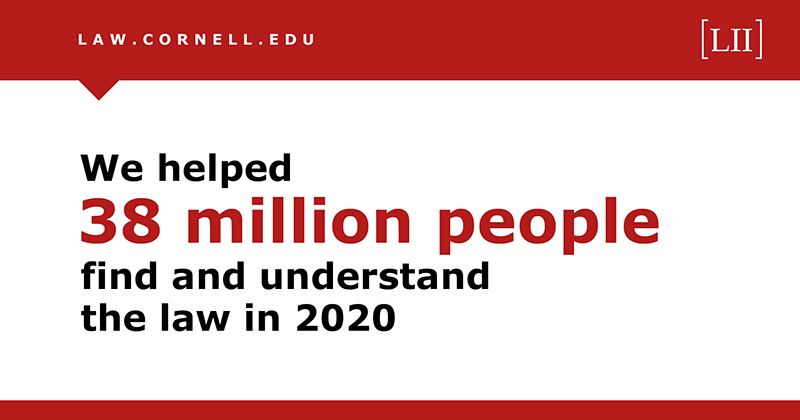LII in 2020: A By-The-Numbers Year in Review

While it seems like much longer, we started off 2020 just a year ago by presenting the prior year as a series of significant numbers. Without intending to minimize what we all went through since then, here’s 2020 “by the numbers” for LII:
38,856,622 people used our website 66,399,539 times and spent a total of 1,581 years reading 164,336,608 pages of content. Please read more about that in the Cornell Chronicle article: Institute Breaks Record in 2020, Making Laws Easy to Access.
3,751,971 referrals arrived from 49,349 websites, including:
- 139,396 from educational platforms and institutions,
- 187,951 from federal, state, and local government,
- 252,738 from news organizations,
- 351,293 from Wikipedia, and
- 1,391,868 referrals from social media.
1,351,432 pages of state regulations content made their way to the public. With sponsorship from Public.Resource.Org and a raw data feed from Fastcase, LII developed and made available to the public a comprehensive collection of state regulations. We had long hoped to facilitate access to law below the federal level, and the raw data feed let us build a comprehensive collection from the start, so we can see how federal law plays out at the state level.
$130,000 dollars went into the Tom Bruce Legal Information Innovation Fellowship Fund. Once it reaches $400,000, that endowed fund will pay for a Fellow to spend the summer in Ithaca each year advancing the state of the art in legal informatics and related fields.
1,041 donors responded to a short donor survey. Those results will not only help us focus our efforts on the website and improve our communications with you, but also provide valuable insight into how people use and perceive Free Law resources.
964 Wex definitions were improved by Cornell Law students, including timely updates to articles such as “blanket search warrant,” “electioneering,” and “Citizens United.”
198 new entries in the Women and Justice collection, including summaries of the UK Domestic Violence, Crime, and Victims Act, the New South Wales Anti-Discrimination Act, the Ghanaian Human Trafficking Act, and the Tunesian Law on Eliminating Violence against Women.
7 apps in the Cornell Tech Law App Showcase for which LII language and data science specialist, Dr. Sylvia Kwakye, served on the judging panel. In addition to immigration topics (asylum, Green Cards, visas, citizenship, and immigration relief), app topics also included divorce case assessment and assistance dog rights.
4 presentations at this year’s virtual Law Via the Internet Conference. Craig Newton spoke on Georgia v. Public.Resource. Org; Sara Frug presented on a panel on free access to scholarship and on another panel on the potential for free access to law publishers to help downbias legal data sets that support artificial intelligence applications; Neli Karabelova presented on a panel discussing how to communicate user impacts.
122 student employees, many of whom were displaced from other summer jobs by the COVID-19 pandemic.
Last year, 8 full-time staff members ran the LII:
- 5 technologists
- 1 office manager
- 1 communications specialist
- 1 lawyer


